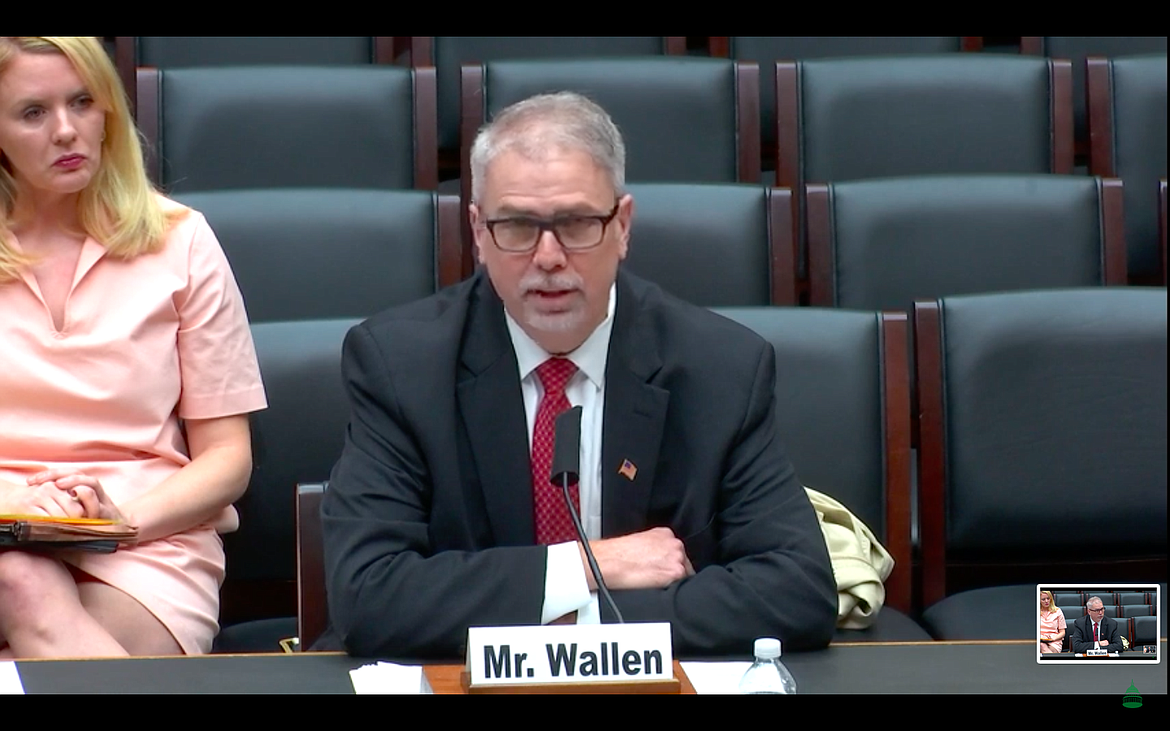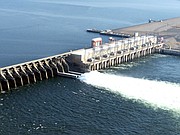Grant PUD chief testifies before House
WASHINGTON, D.C. — With demand for electricity in Grant County growing, federal energy regulators need to make it easier for hydroelectric generators like the Grant County Public Utility District to relicense dams and improve power production, PUD General Manager Richard Wallen told members of the House of Representatives on Thursday.
“Our load is growing, and we are approaching outgrowing physical output in 2026,” Wallen said. “We need new generation or new ways to get it.”
Speaking before the House of Representatives’ Committee on Energy and Commerce subcommittee on energy during a hearing on proposed changes to the licensing process for hydroelectric dams, Wallen said the PUD wouldn’t need to seek relicensing for Wanapum and Priest Rapids dams for 30 years. However, he said, energy providers like the PUD would benefit from a streamlined process to shorten the licensing process for power-generating dams.
“We’re good at Grant until 2052,” Wallen said.
The PUD’s two dams were last relicensed with the Federal Energy Regulatory Commission in 2008 for 44 years, according to PUD spokesperson Christine Pratt.
Wallen was joined at the three-hour hearing by Malcolm Woolf, president and CEO of the National Hydropower Association; Tom Kiernan, CEO of American Rivers, which lobbies for river restoration and is supporting calls from Native American groups to remove Snake River dams; Mary Pavel, an attorney and member of the Skokomish Tribe on the Olympic Peninsula; and Chris Wood, president and CEO of Trout Unlimited, a conservation group advocating on behalf of fisheries and anglers across the country.
Everyone agreed that while it only generates around 7% of the nation’s total electricity, hydroelectric power is an invaluable renewable resource crucial to the sustainability and reliability of the electric grid.
“A big reason companies like Sila (Nanotechnologies) are locating in Washington is because of hydropower,” said Rep. Cathy McMorris Rogers, R-Spokane.
However, dams impose costs and consequences as well on the environment, wildlife and affect treaty obligations with Native American tribes, noted subcommittee chair Rep. Bobby Rush, D-Ill., who also described hydropower as a “wonderful source of zero-carbon electricity.”
“This is indeed a complicated issue, one deserving of this subcommittee’s attention,” Rush said at the beginning of the hearing.
Both Woolf and Kiernan have spearheaded a formal Uncommon Dialog, - a formal way of convening subject matter experts to address an issue - which brought together both the hydropower association and American Rivers along with representatives of Native American tribes and conservation groups to craft a series of changes to current dam licensing rules. Those rules are intended to cut through disagreements and have the support of all parties involved.
The proposed changes would make the Federal Energy Regulatory Commission — which currently licenses all hydroelectric power dams — the lead agency responsible for coordinating all other federal government agencies, involve tribes directly in the process rather than through tribal trustees in the Department of Interior, and enact a time limit on the licensing process that begins upon application submission.
“It’s more complex to relicense a hydropower dam than a nuclear power plant,” Woolf said, noting the average time it takes to reauthorize a dam is 7.6 years.
“It’s way too long,” Woolf said.
He compared the lengthy federal licensing of a hydropower dam with state licensing of wind projects, which can only take one year in Texas or three years in California.
There are about 90,000 dams in the United States, Woolf noted, and only 3% of those generate power. Of those hydroelectric dams, around 75% are owned by public entities — 25% by organizations like the Grant PUD and 50% by the federal government through the Bureau of Reclamation or the Army Corps of Engineers — Woolf said.
Pavel said making Native American tribes and their governments direct participants in the process would shorten the licensing process considerably, citing the lengthy fight the Skokomish waged beginning in the 1970s to get their interests considered in the relicensing of Tacoma Public Utility’s Cushman Hydro Project.
“The tribe would have been at the table with the licensee early on,” she said. “Our tribe is just a little tribe. If Tacoma would have known we were the people they needed to talk to, they would have done that.”
Charles H. Featherstone can be reached at cfeatherstone@columbiabasinherald.com.




